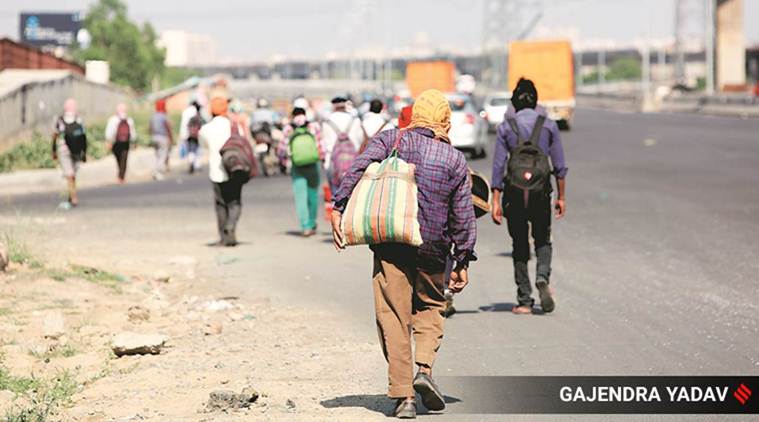
The Indian Express
Migrant crisis in SC: SG Mehta invokes vultures, prophets of doom, Sibal says don’t make it personal
“Some High Courts”, Mehta said, “are running a parallel government”, alluding to the fact that many High Courts had questioned the governments at the state and the Centre on their handling of the Covid crisis.
by Ananthakrishnan GArguing the Centre’s case before a three-judge bench of the Supreme Court, Solicitor General Tushar Mehta questioned the personal commitment of those who were seeking to intervene in the matter. Calling them prophets of doom, he said they needed to prove their credentials.
Soon after finishing his submissions, Mehta told the bench of Justices Ashok Bhushan, S K Kaul and M R Shah: “I have something more to say as an officer of the court. I have a complaint”.
“A large number of steps were taken by the government and the Supreme Court was fully satisfied about it earlier. But we have something called prophets of doom who only spread negativity, negativity, and negativity. All these people writing on social media, giving interviews, cannot even acknowledge what is being done…They are not showing any courtesy to the nation.”
“State governments and ministers are working overnight. None of these people acknowledge,” Mehta said.
“There was a photographer who went to Sudan in 1993. There was a vulture and a panic-stricken child. The vulture was waiting for the child to die. He photographed it and the photo was published in The New York Times and the photographer was awarded the Pulitzer Prize. He committed suicide after four months”, Mehta said.
His reference was to South African photojournalist Kevin Carter’s photo which had become a subject of international debate on the professional responsibility versus personal duty of a journalist.
“He was not an activist. He was not running an NGO. He was a man with a conscience…A journalist had asked him, what happened to the child? He said I don’t know, I had to return home. Then the reporter asked him how many vultures were there? Carter said one. No, there were two — one was holding the camera, said the journalist,” Mehta said.
“Those who come before your Lordships, let them establish their credentials. They earn in crores. Have they spent a penny? People are feeding people on the streets,” the SG said. “All these people critiquing, had any of them cared to come out of their AC offices to help?”
“For them, Lordships are neutral only if you abuse the executive,” he said, adding that failing to do so invites comparisons with the ADM Jabalpur moment (the landmark case where the court is criticised for giving into the government).
“Some High Courts”, Mehta said, “are running a parallel government”, alluding to the fact that many High Courts had questioned the governments at the state and the Centre on their handling of the Covid crisis.
A little later, the SG objected as Senior Advocate Kapil Sibal rose to argue.“This court cannot be made a political platform”, Mehta said.
Sibal responded: “I want to participate in a humanitarian issue.”
The SG said Sibal may argue if he is for a state and that he would oppose him if he was appearing to argue some interlocutory application.
Sibal, who was appearing on behalf of two organisations, said it was a humanitarian crisis that had nothing to do with politics. “Don’t make it personal”, he told the SG.
Mehta asked Sibal, “What’s your contribution in the crisis?” Sibal replied: “Four crores. That’s my contribution,” adding that he wanted to assist the court as a counsel.
Sibal said that under the Disaster Management Act, a national plan should be prepared by the National Executive Committee, which is then approved by the NDMA.
Section 12 of the national plan has guidelines for minimum standards of relief which the National authority has to recommend, he said.
The minimum standards include shelter, food, drinking water, medical cover and sanitation, Sibal said, adding that till date no minimum standards have been set up for any of the these categories.